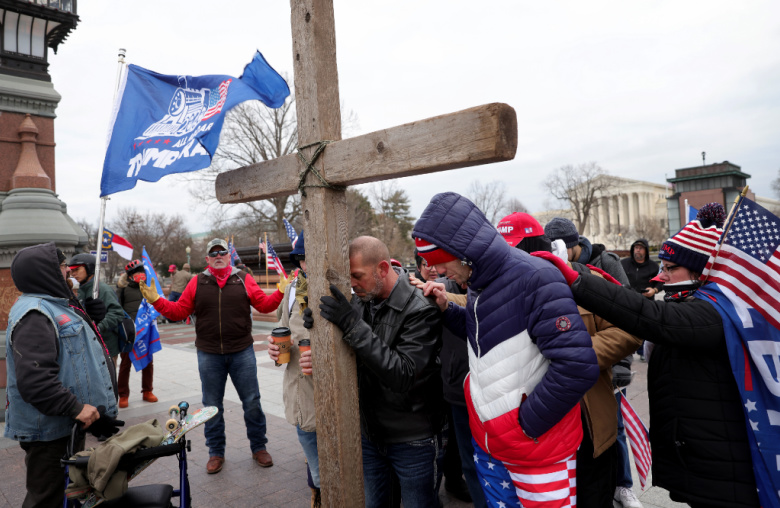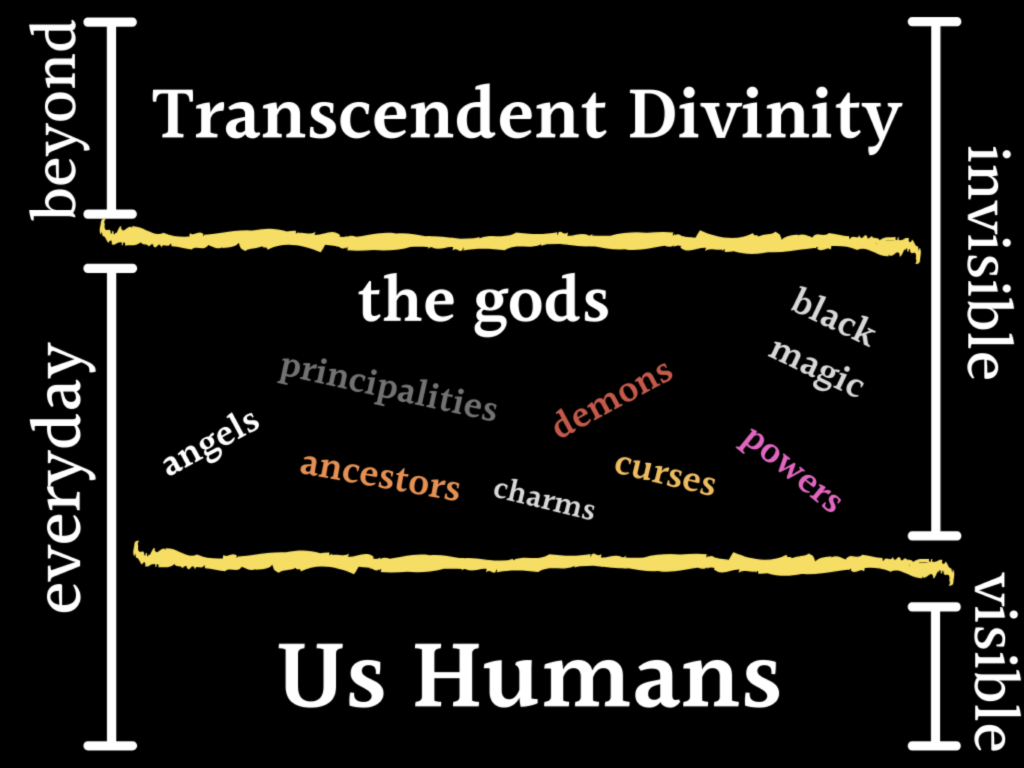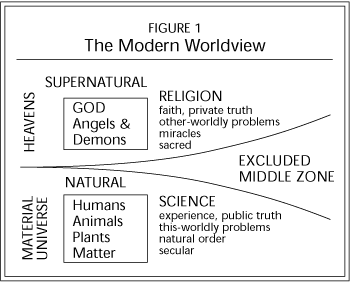Should conservative Christianity be charged as partially responsible for inciting violence in the past Capitol Assault and possibly in the near future at Biden’s inauguration?
Arrests are still being made as responsibility is being assessed for the destruction and death on January 6th. Should Conservative American Christianity be added to the list?
How do we come to terms with crosses being raised, “Jesus Saves” banners waived, and the Father’s blessing prayed during the on January 6th?
How do we reconcile countless Christians, spurred on by prophetic words, who believe a miracle (perhaps violently) will still occur to overturn Biden’s inauguration and install Trump for a second term?
How do we understand countless Christians aligning with QAnon’s conspiracies and prophecies?
Is this really Christianity, or something else?
Some are quick to dismiss the mixing of Christian symbols with the protest-turned-riot. This is just the misguided mixing of crosses and confederate flags, they say.
Others say the mixing of crosses and Confederacy is just the outward rhetoric of the inner rot of white, racist conservative Christianity. The Capitol Assault is just the revelation of what evangelicalism has always been, these say.
Maybe Christian Nationalism is the real culprit for this violence?
And if so, how does it relate to Christianity in America?
To put the question mostly clearly to conservatives (of which I count myself), has Christian Nationalism become its own religion, replacing or corrupting Christianity?

My answer: Yes! And, No!
Yes.
Christian Nationalism functions as its own religion.
And, No.
Christian Nationalism is not a religion like Christianity, because Christianity is a formal religion and Christian Nationalism is a folk religion.
And this distinction between formal and folk religion makes all the difference for the gospel witness of the church in America.
The difference between a formal and a folk religion explains why Christians seem to do and believe things unreconcilable with Christianity.
As Sidney Williamson says,
Most Christians live on two unreconciled levels. They are members of a church and ascribe to a statement of faith. But below this system of conscious beliefs are deeply embedded traditions and customs implying quite a different interpretation of the universe and the world…In the crises of life and rites of passage the church is an alien thing.
Quoted in Understanding Folk Religion, 15.
3 Levels of Reality
What makes a folk religion different than a formal religion?
Paul Hiebert reminds us that mostly people function on three levels of reality.

The lowest level is “this world” that is “seen”. This is the immediate level of experience, of science, of how we live. This is the level of human relationships and material causes.
The middle level is within “this world” but is “unseen”. Outside the West (though less so these days), this level is populated by ghosts, spirits, ancestors, magic, curses, and omens.
This middle level influences and is a part of everyday life (that’s why it is part of “this world”). While invisible, it is felt in everyday life. And this middle level can be manipulated, for good or for evil—through prayers, spells, rituals and rites, and sacred objects.
The top level is the “other world” that is “unseen”. This is where God is, or whatever transcendence existence is envisioned.
The trouble in the West is that we have excluded the middle level, reducing life to a materialistic, science-based reality of human concern (lower level), and a God focused reality (top level).

In the West we just think that human existence is on the lower level. And formal religions are the top level. And that it.
But the reality is we alway seek to manage the middle level, and that is where folk religions focus and flourish.
Folk vs. Formal Religions
Paul Hiebert, R. Daniel Shaw, and Tite Tienou extensively explore folk religions and a Christian response in Understanding Folk Religion.
I’m summarizing their work below, and applying it to a Western missionary context.
Formal Religion:
A formal religion (Christianity, Buddism, Islam, Mormonism) is focused on the top level (transcendent and invisible).
This top level gives answers to questions of the origin and destiny of the world and humanity, the meaning of good and evil. It is focused on what is true and good.
A formal religion has a defined set of beliefs, a defined set of practices, and a defined structure of leadership.
The main focus of a formal religion is TRUTH.
Folk Religion:
A folk religion (animism, types of paganism, witchcraft, new age) is focused on the middle level (this world, but invisible).
This middle level gives answers to questions of practical importance to everyday life. How do I flourish (make money)? How do I keep/get good health? How do I make decisions about the future? Who is to blame when things go wrong?
A folk religion doesn’t have a defined set of belief, practices, or leaders.
It just has ad hoc set of beliefs, loose patterns of practice, and informal leadership who can change, shape, manipulate, and control the flow of power (energy or force) within the spiritual realm (the middle level).
These ad hoc practices include rituals and rites, magic and spells, reading omens, or contacting/controlling spiritual beings.
The informal leadership included shaman, witches, sorcerers, mediums, and others who have influence or connection in the middle level.
These leaders (even if outcasts of sorts) know what is “really going on” in a world, and will tell you the proper remedy for your ills.
In essence, folk religions aren’t interested in logical consistency or the coherence of belief.
They are focused on pragmatic results!
The main focus of a folk religion is POWER.
American Christian Nationalism Is A Folk Religion
For too long we’ve assumed that because the formal religion in America was Christianity that people attending churches were authentically Christian.
Or we’ve thought that when people leave Christianity as a formal religion then they either join another religion or become religionless.
But in reality, many people are publicly Christian while privately they follow some other folk religion (consciously or not).
Or they leave formal religion and join a folk religion.
(Tara Isabella Burton doesn’t use the language of folk religion in her Strange Rites: New Religions for a Godless World, but this is what she is describing.)
When the struggles of life hit, when meaning and purpose is lost, when life feels out of control (without power), the people—Christian or not—turn to sources of POWER (middle level), regardless of its TRUTH (top level).
Christian Nationalism (and QAnon) is not cult. A cult is just a really small formal religion with obscure beliefs centered on a charismatic leader.
But Christian Nationalism does function like a folk religion.
It has its own myths of how America country was founded (overlooking unfavorable historical realities). It has holy days and festivals celebrating America’s founding, its keys leaders, and its fallen soldiers. It has sacred places to which pilgrimage is made.
Of course, those myths, festivals, and places could just be part of any kind of nationalism, and they need not be a folk religion.
3 Reason Why American Christian Nationalism is a Folk Religion
American Christian Nationalists are different than those who celebrate their country because American Christian Nationalists believe divine forces are especially interested in building up and protecting America. And this “divine force” is draped in the language of Christianity.
Here are three features that show how American Christian Nationalism functions like a folk religion.
Power over Truth
American Christian Nationalism functions as a folk religion (especially among conservatives over the last 50 years) because of its relentless pursuit of POWER (folk religion emphasis) and its declining commitment to TRUTH (formal religion emphasis).
This pursuit of power (politically) has been successful—in a sense. But it has come at the expense of truth. Many (myself included) lament the damage done to gospel witness during the Trump presidency.
The election of Trump was rationalized by conservatives through ignoring or whitewashing the truth of his character. Many conservatives began by holding Trump’s character at arms length but have steadily grown in defending his character.
And the rise of adherents to the QAnon conspiracy theory is another disregard for truth in the service of a “secret power” who knows what is really going on (see older and newer commentary).
Shaman and Mediums in American Christian Nationalism
I would argue that the likes of Sean Hannity and Tucker Carlson are the local (nightly news) shaman of American Christian Nationalism (I don’t mean to suggest they are actually involved in the occult. Rather that conservative Christians go to them to find out what is really happen in the world. Hannity and Carlson interpret the signs and give meaning to what is happening that is distressing, shocking, or dangerous).
People like Paula White (watch the video from election night) and all the other prophets giving words about Trump’s re-election fit the bill of mediums seeking to tell the future (which ignores the fact that most often Christian prophecy is forth-telling, not foretelling).
Q of QAnon is a high wizard dispensing the secret order of the world, offering clues and puzzles, hinting at events that may or may not come to pass.
The fact that prophets who apologize for their false words are getting death threats just speaks to the seeking of power over truth.
Festivals and Pilgrimages
It is hard not to think of the Jericho March in mid-Decemeber and the Capitol Assault as religious festivals attempting to elicit power from on high to accomplish a worldly goal.
For example, see this commentary of the Jericho March (which I also watched personally) and this footage from the Capitol Assault referencing prayer, sacred space, and a holy duty while within the Senate Chamber.
The blowing of shofars, waving of banners, raising of crosses, and offering of prayers “invoking” Jesus’ name in these “sacred” places is a mashup of authentic Christian symbols and practice dropped into a context and purpose foreign to Christianity (the advancement of purely political goals wrapped in spirituality).
The Old Testament and Other Gods
I could go on and on about American Christian Nationalism, its roots and history in the European Christendom (and its racism and anti-Semitism), and its expression in 19th and 20th Century Fundamentalism (and Progressive Liberalism, though they would like to forget they had a hand in forging American Christian Nationalism too).
But really, folk religion is just a fancy way of remembering what the Bible has always taught, and what the history of Israel clearly reveals.
Humanity is prone to worship other gods, even when we have seen the only true God up close and personal.
It didn’t take long for Israel to yearn for the golden calf after being delivered from slavery in Egypt. Israel always struggled with mixing worship of God with a little side hustle with other local gods. This is ultimately what led Israel into Exile (read Jeremiah and Ezekiel).
But the modern West has reduced idolatry to a list of vices like greed, lust, jealousy, and lying. The excluded middle has made us feel that folk religions weren’t worth talking about, or discipling people out of.
As Christopher Wright says in Here Are Your Gods, “The whole idea of gods and idols, though it is such a prominent theme in the Bible (especially in the arena of public and national life), seems dangerously neglected in contemporary Christian political discourse and analysis” (68).
And we are seeing the fruit of this neglect today in the rise (even radicalization) of American Christian Nationalism.
The Way of Jesus
The gods of folk religion are restless, wily, and hungry. And the Church in America has overlooked and pandered them for far too long.
If we, American Christianity, are culpable for the violence during the Capitol Assault, it is for this reason, that we fostered an unreconciled faith, tending to only the highest level while other powers have seduced us in the middle level.
The subtitle to Wright’s book has it right. We need “faithful discipleship in idolatrous time.”
And this faithful disciples means living like Jesus, in all things: in power and weakness, in prophecy and in silence, with the poor and the rich, in places of power and poverty.
Don’t miss a post because of social media algorithms. Join my newsletter and get—FREE—the first chapters to Does God Really Like Me?.
(Disclaimer #1: I’m not saying that everyone who voted for Trump has been corrupted by the folk religion of American Christian Nationalism. But if you believe the QAnon prophecies, believe the “word” of prophets over the lack of credible evidence of election fraud, or think the violence of the Capitol Assault was justified, then you probably have mix the folk religion of American Christian Nationalism with the true religion of Christianity.)
(Disclaimer #2: As a charismatic Christian myself, in no way am I suggesting that miraculous healings, demonic deliverances, or prophetic words are wrong. In fact, I think they are right, when done “christianly”. But lately too much is serving the gods of another religion.)
(Disclaimer #3: Christianity at its best is a combination of a formal religion and a folk religion. The power of Jesus through the Spirit over other gods/demons in the ancient and non-Western world has always been a major reason for the growth of Christianity (hence like a folk religion). And yet the claims of the Church have always been of truth of a universal kind, even when shown in the weakness of the cross (hence like a formal religion.) But to fill this all out will require another long post.)
If you would like coaching or spiritual direction around this issue, please contact Cyd Holsclaw

